- Home
- Raymond Benson
The Black Stiletto: Stars & Stripes Page 3
The Black Stiletto: Stars & Stripes Read online
Page 3
Today Senator John Kennedy announced his run for president. I like him. He’s very handsome and he seems smart. I can’t believe so many Americans don’t want him to be president because he’s Catholic. Why should that make a difference? Someone asked him if he was concerned about that, and Kennedy replied that the only thing we should care about is whether or not a candidate believes in the separation of Church and State. What a great answer!
After I cleaned up the dishes, I became restless. I needed to release some tension. I thought about going down to the gym and working out with the weights, but I also wanted some fresh air, even though it’s cold outside.
Tonight the Black Stiletto is going to make her first appearance of 1960.
3
Judy’s Diary
1960
JANUARY 3, 1960
It’s late at night. Actually it’s early morning, 2:00 a.m. I just got back to the apartment and I’m hurt. I don’t know how badly yet. My face is a real mess and every bone in my body feels broken.
The Black Stiletto slipped out around 10:00. I did my usual running-along-the-roof of the gym, hopped to the top of the next building on 2nd Street, found my favorite telephone pole, shimmied down, and I was on the street. No one saw me. It was cold outside, so I wore my warmer Stiletto outfit. I was equipped with the knife strapped to my leg, the small blade hidden in my boot, my rope and hooks, a flashlight, and my backpack.
I was angry about Freddie. I hated seeing him in that condition, so it made me want to take it out on a street thug or two. Would I find any robberies in progress? Someone trying to hold up a liquor store? I actually hoped I would. So I headed west toward the Bowery, which was always a hot spot for crime. Much of that long, north-south thoroughfare was pretty seedy. Unfortunately, it must have been too darned cold for the crooks to be out. They were all inside getting drunk. If I hadn’t tied one on so spectacularly on New Year’s Eve, I might’ve stepped inside one of the dives and joined them.
A little farther west was Little Italy. I darted from shadow to shadow until I found myself at Mulberry and Grand. For a moment I felt a pang in my heart. I thought of Fiorello and how much I missed him. So much time has passed since we were together, but it also seems like yesterday. If it wasn’t for Fiorello’s death, there would be no Black Stiletto. It’s ironic that he was my boyfriend and lover, and yet he was a killer, a Mafia soldier who took orders from criminals. I was naïve then.
Some of the Italian restaurants were still open. I smelled the rich food in the air and my stomach growled. The dinner I’d made myself didn’t exactly equal a steaming plate of pasta and meatballs. As I hid in a dark doorway, I watched patrons leave the establishments, walk to the corner, and hail taxis. I might have been crazy to just squat there and shiver, but the street brought back warm memories.
Eventually it was time to move on, so I did. I went south, past Broome and Grand Streets, but there wasn’t a crime to be found anywhere. I figured I’d give myself another fifteen minutes—because I was freezing my tail off—and then I’d head back home.
There appeared to be more activity on the streets south of Canal Street. I never spent much time in Chinatown except to go eat the fabulous food with Lucy or Freddie. It was a very different world, almost as if it is its own little country within the much grander city. Of course, that’s what it is. A community that existed by its own rules and customs. It was intimidating in a way. I’m pretty sure all white people felt as I did—we were outsiders. The Chinese were happy to feed us, do our laundry, and take our money, but beyond that their lives were a mystery.
There were more restaurants in Chinatown than in Little Italy, and many were still open for business. The odors of egg rolls and cooked pork permeated the air and once again my tummy made rumbling noises. What would happen if I walked into a place and ordered some chicken and broccoli and fried dumplings to go? I now had more of a hankering for that than I did the pasta.
But I kept going, flitting from doorway to doorway, staying out of the beams of the streetlights, and gazing at the strange buildings covered with Chinese writing. Many places also had the names in English, but most did not. Some of the English translations were kind of funny, like the “No Louding” sign in front of a door or the one in a shop window that said, “Be careful do not break it, it will get a breakage.” The neon signs were colorful and exotic, and suddenly I felt like I wasn’t in America anymore. I’ve never been out of the U.S.A., but I thought this was what it must be like.
All the shops were closed, but I spent some time looking in the windows at the various dresses—they call them “cheongsams.” I know that ‘cause it was written in English in one place. There were also all kinds of flat sandals and scarves. I thought I might have to return during the day—not as the Stiletto!—and buy something. It was all very pretty. I could just imagine Freddie’s face if I walked into the kitchen one night dressed up in all that silk.
As I continued my exploration, I heard voices of people on the street and inside the bars and restaurants. Their language was musical and their laughter contagious. I suppose it was similar to the Japanese that Soichiro spoke, but it was also vastly different. It was more sing-song, for the Chinese held vowels longer, producing a tone behind them. I guess they were vowels, but how should I know?
When I got to Bayard Street, I decided I’d had enough. If I was out much longer, I’d be the Black Icicle, ha ha. I crossed Mott Street and took a left on Elizabeth. A dark storefront window caught my eye. It was full of toys and dolls. It was strange to see dolls with Asian faces. I wasn’t used to that. The girl dolls were dressed in little cheongsams, too. Boy dolls wore loose trousers and a long jacket with a high, stiff collar. A little sign said “doll in Mao clothe” in English and Chinese. I then realized it was an effigy of Mao Tse-Tung! Would that be considered Communist propaganda? Probably not. This was America, and after all, it was just a child’s plaything.
As I stood at the window, a car pulled up to the curb directly across the street from me. I swiftly moved to the dark doorway and crouched where I couldn’t be seen. The New York cops were still out to get me, and I couldn’t take too many chances. But come to think of it, during my journey through Little Italy and Chinatown, I didn’t see a single policeman. Strange. I usually can’t go out at night without spotting at least one patrol car.
The vehicle across the street was a black Buick. It looked shiny and new. I don’t know much about cars, but I know enough. Somebody wealthy owned this one. There were two men inside, the driver and a passenger. The car idled in front of Lee Noodle Restaurant. The lights were on inside the place, but I couldn’t see the interior because there was one of those Asian decorative folding screens standing in the window.
I didn’t want to move while the men sat there, so I waited. After a moment, the passenger got out of the car. He was Chinese, probably in his twenties, maybe early thirties. It’s so hard to tell how old Asian people are. The man wore a heavy coat but no hat. He strode purposefully to the restaurant’s front door and tried to open it. It was locked; the place was closed for the night. He knocked loudly. And again. Finally, an older Chinese man appeared. The newcomer barked some words. He sounded angry. The older man unlocked the door and let him inside. Both disappeared from view. The car’s engine continued to run. Exhaust poured out the back and created a thick, gray cloud that filled the street.
It was getting colder by the minute, and I remember thinking that whatever business that guy had inside the restaurant, it had better be quick so I could get home and make some hot chocolate!
And that’s when I heard the four gunshots, followed by a woman’s screams.
I didn’t hesitate. I blindly ran across the road, skirted behind the idling car, and burst through the door, which the older man had left unlocked. I entered the small restaurant and beheld a shocking tableau. The old man lay on his back between two tables. His white shirt had two black-red holes in the front, and blood seeped across his chest. Another Chinese m
an, also gray-haired, was crumpled half-on, half-off a table. He, too, had been shot dead.
The passenger from the car looked younger up close. Probably early twenties. He pointed a handgun at a terrified woman and a teenage boy, both Chinese. They clung to each other in fright. She was crying and babbling in her language. It was clear that the bad guy was about to shoot them, too.
The gunman caught sight of me and turned the gun in my direction. I immediately performed a Yoko-geri—a side kick—and disarmed my opponent. This surprised him, and I didn’t give him a chance to react. I moved in to deliver a resounding punch to his jaw. His head jerked appropriately, but he didn’t fall back. I immediately alternated the delivery and threw a blow with my left fist—but he deftly blocked it with a Harai-te—a sweeping gesture that powerfully knocked my attack out of the way. Before I could comprehend what had just happened, I felt a tremendous strike in my stomach. He had kicked me! And then, as I was in the process of doubling over, he landed three swift wallops to my face with moves I’d never seen before. Needless to say, I went down.
The woman screamed louder.
The gunman started to run out, but he had to get past me to reach the door. I had the presence of mind to stick my leg up as he jumped over me. He tripped and crashed into a table, pulling off the tablecloth and condiments.
By then we had company. The driver entered the restaurant. He, too, was a young Chinese fellow. He went straight for me as his pal stood. I rolled and rose to my feet just as the newcomer attacked me with martial arts techniques that were beyond my comprehension. Dear diary, I had attained a black belt in karate and judo, but these two guys had something else going on. Looking back, I figure it was the difference between Chinese and Japanese martial arts. Whatever it was, they had me at a disadvantage.
I held my own, though. The next thirty seconds was a flurry of hand blocks, front and side kicks, and my “crescent moon” kicks—one of which successfully knocked the second guy to the floor. Judo throws were impossible. I simply couldn’t get close enough to my opponents. They had the ability to hit and slap me repeatedly and rapidly, and it hurt like the dickens. I tried my best to anticipate the maneuvers with what Soichiro taught me, but the blocks didn’t work. It was as if their technique had been developed specifically to combat my own. The two men moved incredibly fast, using their entire bodies acrobatically to deliver excruciating jolts with their fists, spear hands, and feet.
It didn’t take long for them to have me against the wall. I was doing my best to defend myself, but I was losing. It was only then that I got a good look at their faces. The gunman, on the left, had pockmarked cheeks and a scar that ran from the left corner of his mouth along the edge of his chin. The other guy wasn’t as distinctive, but I noticed he had blue eyes instead of brown, the way most Chinese do.
I couldn’t take much more punishment, so I turned to the last resort—I drew my stiletto and pointed the blade at them. By then, the two men were working in tandem. Pock Face feigned a kick, so I prepared to block it, but it was Blue Eyes who actually delivered a kick I didn’t see coming. He knocked the knife out of my hand and it went flying across the room. Then Pock Face performed a back kick, similar to the Ushiro-geri that I knew, but different, and it whacked me hard in the face. I went down with stars in my eyes and a ringing in my ears. I think I may have lost consciousness for a second or two, for the next thing I knew, the woman was screaming again. I looked up and couldn’t believe what I was seeing.
The teenage boy was now fighting the two killers, and he was using the same techniques as his opponents. The woman—who was undoubtedly the boy’s mother—was pleading for him to stop. There was no translation needed: “Stop it, they’ll kill you!”
Dazed, a bit broken, and, yes, bleeding from the mouth and nose, I forced myself to get up. I didn’t know how old the kid was, but if a fourteen- or fifteen-year-old boy was going to come to my aid, then, by God, I was going to his!
So I joined the melee. And that kid was good! He held his own. I remember at one point he was behind a table that was still covered with someone’s dirty dishes. The boy grabbed the tablecloth, pulled it, and flung it so that all the plates soared at Blue Eyes like missiles. The tablecloth itself spread in the air and covered the man’s head like a canopy. Now blinded, he was momentarily helpless. The kid looked at me and nodded. That was my cue. I let the cloth-covered intruder have it with simple American boxing triple punches.
But Pock Face got the better of me when I wasn’t looking. I must have still been shell-shocked from before, because I should have sensed him coming. I’ve always been able to anticipate attacks, but this time it didn’t work. Something hard and heavy hit me on the side of the head, and all the noise around me ceased. It was as if I had been dunked underwater.
Everything went fuzzy, and then someone was lightly slapping my face.
“Lady! Lady!”
I held up a hand so he’d stop. My vision was blurry, but I could tell it was the boy. He was kneeling beside me.
I heard his mother whimpering. I turned my head. She had thrown herself over the body of the older man and was wailing with grief.
Then I became aware of another familiar sound. Police sirens headed our way.
“You go now!” the boy said. He held out my stiletto.
“Where?” I looked around the restaurant.
“Men leave. Now you go! Hurry!”
I took my knife and sheathed it. He helped me up. I hurt all over.
Dear diary, we trashed that restaurant. As I recall, there were maybe ten tables all together in the place, plus a bar, cash register counter, and a swinging door to the kitchen. By the time it was all over, there were three tables still standing untouched.
I indicated the woman and the dead man.
“Your mother?”
The boy nodded.
“Your father?”
He nodded again, tears welling in his eyes. He then indicated the other dead man. “My uncle.”
The sirens were louder and closer.
“Thank you,” he said. “Now go!”
He didn’t have to tell me again. The last thing I wanted was for the Black Stiletto to be implicated in a double homicide in Chinatown.
So I limped out of there. The cold air hit me like a train, but it helped revive my senses. I got myself together and took off north on Elizabeth, kept to the shadows, and made it safely back to the gym.
4
Maggie
THE PRESENT
The Woodlands facility encompasses just a small part of my practice, but it’s probably the most fulfilling. I visit the nursing home twice a week and monitor a number of patients, whom the staff call residents. A nursing home is generally the last stop these people make during their journey through life. No one likes to say it, but it’s where a person goes to die. The staff—and I—try to make that experience as pleasant and comfortable as possible. For the patients who still have some time left, I treat all kinds of ailments. Dementia is probably the most common one. Alzheimer’s is one of my specialties, although I must admit there’s a lot I—we—don’t know about the disease. There are medications that can treat the behavioral manifestations, but as of today there is no cure.
My private practice is in Lincolnshire. I share it with three other physicians, all of whom specialize in internal medicine and geriatric care. I can’t tell you how proud I was when my name was etched into the glass door—“Margaret H. McDaniel, M.D.” It was a long, hard road to get there, and I’ve managed to keep it going for twelve years. I opened the office when I was thirty-one. Now I’m forty-three, and I can’t imagine another life. I take my profession seriously.
I want to be as diligent as possible when it comes to my patients. With Alzheimer’s, the more you know about a patient, the better. You’re dealing with a person’s entire life. By that, I mean memories. We all take memories for granted until you start to lose them. That’s why I like to know a patient’s complete history, his or her biography
, anything that can help me help the patient regain some foothold in what has become a very elusive past.
And that’s why the case of Judy Talbot concerns me so much.
Judy—I like to be on a first-name basis with my Alzheimer’s patients because it helps me communicate with them better—was already a resident of Woodlands when I started there. She’s seventy-three years old, but the disease makes her appear older. In her case, the onset of Alzheimer’s was sudden and rapid. Within a couple of years she was at an advanced stage, whereas the majority of patients take six to ten years to go through early to moderate to advanced stages. Her case is not unusual, just rare. At the moment, Judy still has use of language, but she finds it difficult to recall vocabulary. She speaks only if necessary, and usually it’s a generic phrase that is appropriate to any situation. “Thank you,” “yes,” “no,” “that’s nice,” “hello,” and “goodbye.” Her long-term memory seems to be completely gone, although Martin tells me she’ll occasionally surprise him by coming out with a sentence or two that refers to something that happened in the past. Judy has not shown signs of aggression, outbursts, or wandering. She has not experienced sundowning. The patient is content with sitting and staring at a television or out the window. She is one of the calmest patients with Alzheimer’s I’ve ever seen. The staff at Woodlands makes sure she takes daily walks through the hallways and goes outside to the garden on pleasant days. At one time, Mrs. Talbot must have been very athletic, for her muscle tone is extraordinary for a woman her age and in her condition. But while the shape of the muscles is still there, she is terribly underweight and therefore thin and frail. Despite that, she often surprises the staff with her strength. I understand there was an incident prior to my joining Woodlands in which she incapacitated a homicide suspect by kicking the man in the groin! I wish I’d seen that. And from hearing that story, all the scars and wounds on the woman’s body trouble me even more.

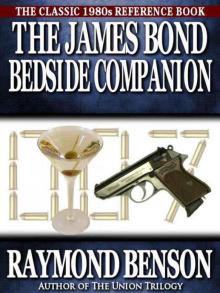 The James Bond Bedside Companion
The James Bond Bedside Companion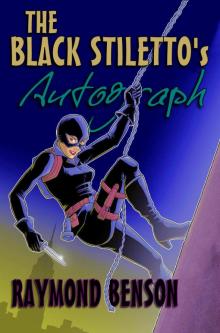 The Black Stiletto's Autograph
The Black Stiletto's Autograph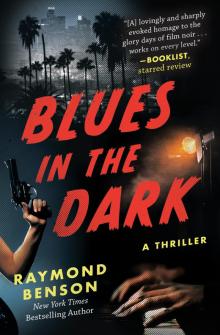 Blues in the Dark
Blues in the Dark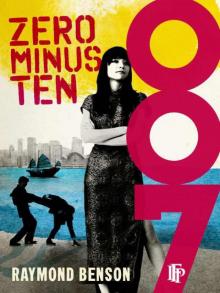 Zero Minus Ten
Zero Minus Ten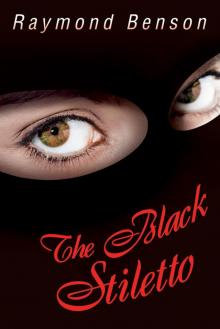 The Black Stiletto
The Black Stiletto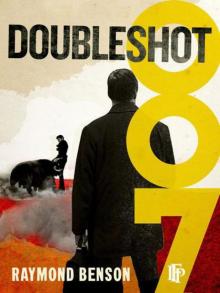 Doubleshot
Doubleshot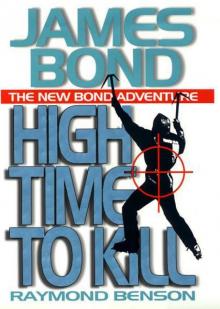 High Time To Kill rbb-3
High Time To Kill rbb-3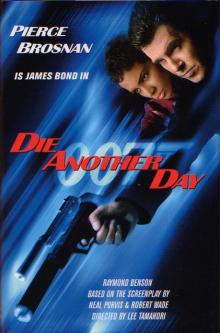 Bond Movies 07 - Die Another Day
Bond Movies 07 - Die Another Day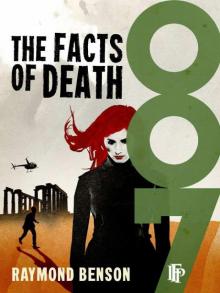 The Facts Of Death
The Facts Of Death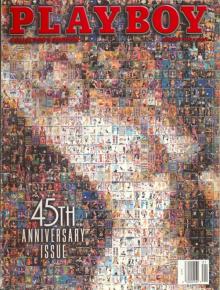 Midsummer Night's Doom
Midsummer Night's Doom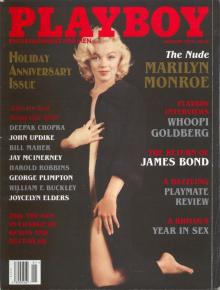 Blast from the Past
Blast from the Past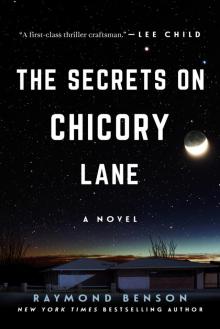 The Secrets on Chicory Lane
The Secrets on Chicory Lane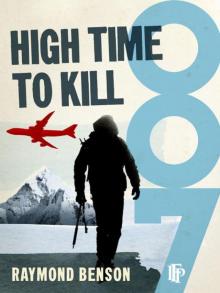 High Time To Kill
High Time To Kill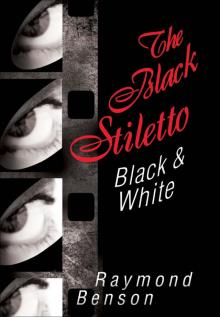 The Black Stiletto: Black & White
The Black Stiletto: Black & White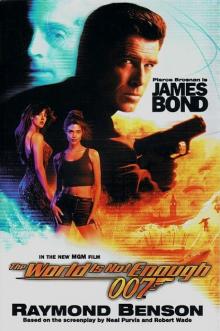 The World Is Not Enough jb-1
The World Is Not Enough jb-1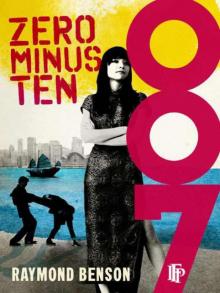 Zero Minus Ten rbb-1
Zero Minus Ten rbb-1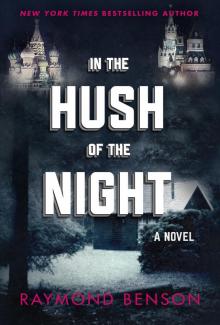 In the Hush of the Night
In the Hush of the Night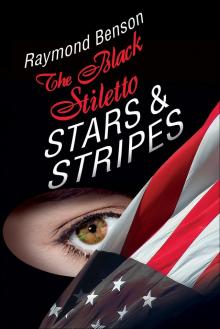 The Black Stiletto: Stars & Stripes
The Black Stiletto: Stars & Stripes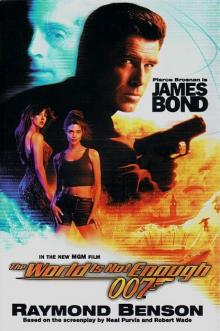 Bond Movies 06 - The World Is Not Enough
Bond Movies 06 - The World Is Not Enough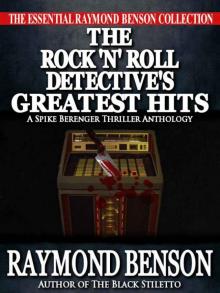 The Rock 'n Roll Detective's Greatest Hits - A Spike Berenger Anthology
The Rock 'n Roll Detective's Greatest Hits - A Spike Berenger Anthology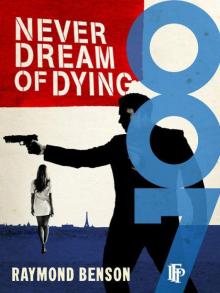 Never Dream Of Dying
Never Dream Of Dying